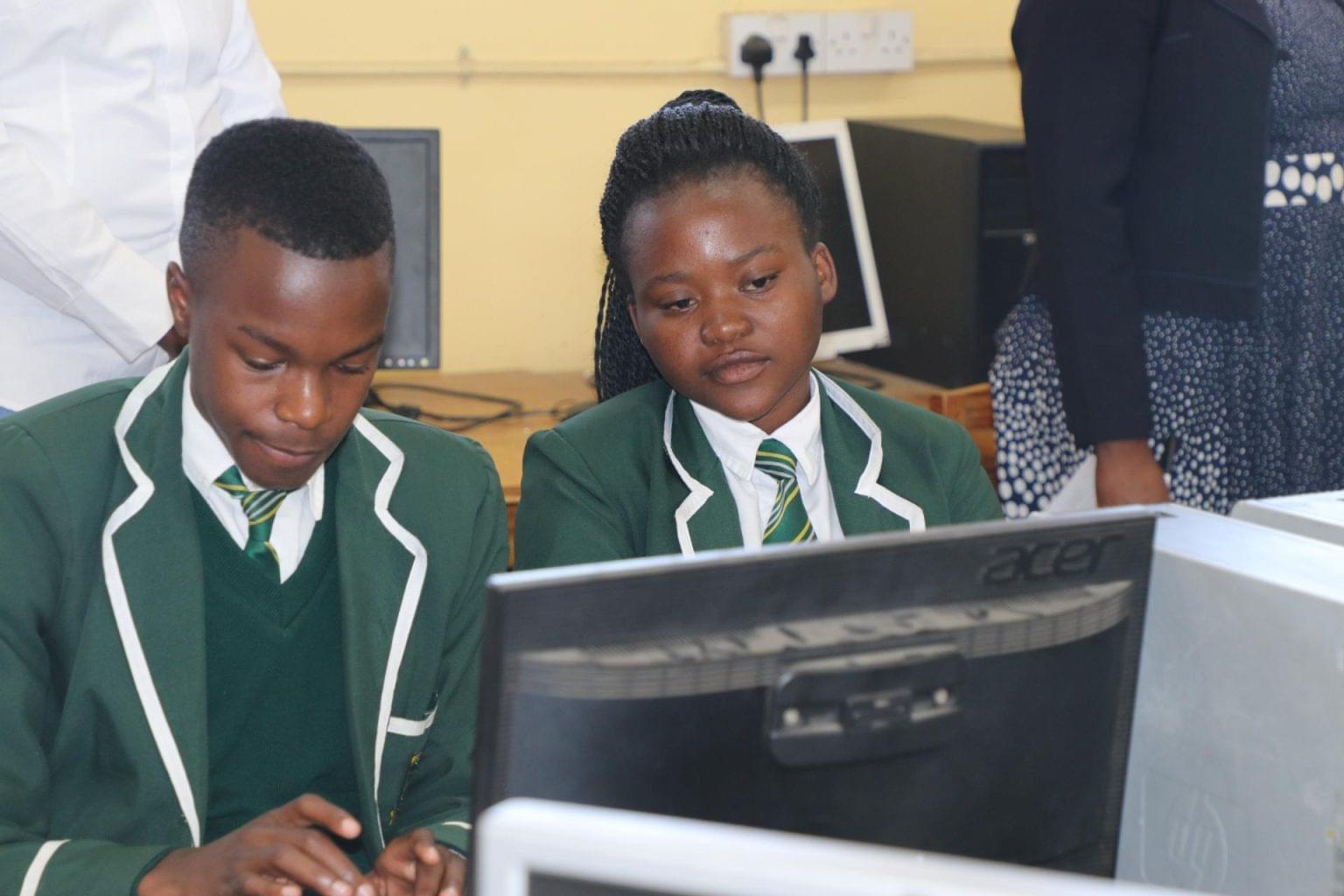Mr. Tapfumaneyi Chiwoto, the headmaster of Cherutombo Secondary School in Marondera jokingly refers to himself as a member of the “BBC” Generation (Born Before Computers).”
While he acknowledges the rapidly changing global and digital landscape, he has equipped himself with the knowledge and skills to ensure that his students and staff are prepared to benefit from the digital revolution.
“The whole world is now going digital; we need to be empowered to get the full benefits of technology. Today the fingers of young people are almost attached to some sort of digital device, we need help to provide better access to the internet but to also protect children from the dangers,” he said.
Cherutombo has an enrollment of 1, 716 student (766 female); 75 teachers and 13 ancillary staff.
Mr. Chiwoto carries the responsibility of leading such large school with great passion and drive. Impressively the O’ Level ICT class had a 93% pass rate, while the ‘A’ Level ICT class had a 100% pass rate. He has big plans to capacitate and improve the school, but currently funding is a huge challenge. The school is connected to the internet through TelOne Fibre connectivity at a cost that is incurred through the school fees paid by parents.
“The school currently has two computer labs with 50 computers and laptops and two ICT teachers. Each Head of Department also has a laptop and projector which allows them to project content to expand students learning,” he said. “This is a great start, but considering the size of our student body, this is not enough- we need more computers, and we need to expand the reach of our connectivity, so all classrooms have access to the internet”.
Currently, internet connectivity only reaches the computer labs and the administration block. This limits the ability of classrooms which are out of range to access online learning.
The current bandwidth of 5MB is not large enough to hold the amount of data carried by the latest learning platforms such as the Learning Passport, a free digital learning platform created by UNICEF in partnership with Microsoft.
The online, mobile, and offline Platform of Learning Passport is unique in that its content is created nationally by the Ministry of Primary and Secondary Education, in line with the National Curriculum. This makes it more relevant and useful to school children, teachers and parents.
UNICEF Zimbabwe has been collaborating closely with various ministries in Zimbabwe, including the Ministry of Primary and Secondary Education; the Ministry of Information Communication Technology, Postal and Courier Services; and the Ministry of Youth, Sport, and Arts and Recreation to coordinate efforts for inter-ministerial cooperation and to champion the implementation of Digital learning in all schools across Zimbabwe.
Currently in Zimbabwe, out of the 10,522schools nationwide, 76% do not have access to the internet, while 36% of schools have no electricity.
One hundred kilometres East of Cherutombo High School, in Makoni District of Manicaland Province, Manhinga Primary School has just begun its journey to transforming the education of their students.
The small school which has a total of 130 students (and 6 teachers (5 females) is located next to the Manhinga Children’s Home, which takes care of orphans and vulnerable children through the Ministry of Public Service, Labour and Social Welfare’s Department of Social Welfare. Many of the students at Manhinga come from the Home.
A solar powered system was installed at the school in 2022 to provide electricity to the teacher house, administrative room and a computer lab, allowing the school to effectively teach ICT lessons to the students. The power has also improved teaching conditions by providing teachers with electricity after hours which will allow them to prepare better for classes, print documents and charge their phones on the charging station. A total of four schools from Makoni district benefited from this project and amongst them is Manhinga Primary.
“This is a great first step for the school. As you can see, the computer classroom is now fully electrified. All that is left now is for us to be connected to the internet, and to have devices. The teachers are already using their smartphones to get information for their lessons. Access to Wifi would change our lives greatly” said Headmistress Mrs. Munetsi.
UNICEF, through the support from United Kingdom, is implementing the solarization project in 154 schools to improve the quality of education for all children by providing power to rural schools and thus contributing to the learners relevant, inclusive, and sustainable education.
UNICEF travelled to Cherutombo Secondary School and Manhinga Primary School with several Private Sector companies including Higher Life Foundation, TelOne, Liquid Intelligent, and Akello, to observe and better understand the needs and challenges within Zimbabwe’s education sector – especially in critical issues such as connectivity, reliable access to energy, lack of devices, affordable content and data and availability of quality digital learning platforms.
Using its convening power and experience, UNICEF is on a global drive to shore up support and investment into the Re-Imagine Education Initiative. This includes exploring various strategies, such as partnering with the private sector, ensuring due diligence before internet connectivity, raising awareness about renewable energy, and exploring subsidies for connectivity and data costs.
The Re-Imagine Education Initiative was born from the realization that all school children, especially those in the “last mile”, need to be connected to the internet and have access to the knowledge and quality learning or they will fail to realize their full potential and development goals. Re-Imagine Education is driven by six pillars: greening education; world class digital learning solutions; connectivity; access to devices; affordable contents and data; and young people engagement. This will afford students, parents, teachers/heads of school, and education providers in receiving and providing quality inclusive education.
The visit is a follow up to the Re-Imagine Education workshop held in late 2022 by UNICEF along with key Ministries in the Government of Zimbabwe, major telecoms, and the private sector. The workshop’s aim was to bring together various stakeholders to establish effective multi-partner mechanisms for better implementation of e-learning in Zimbabwe and to support the Government in harmonizing, at education level, the various ICT and e-learning efforts currently being implemented by the multiple players in the country.
Source NewZimbabwe








